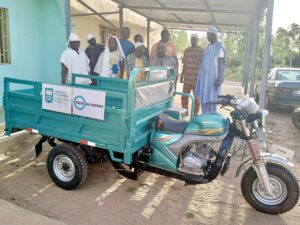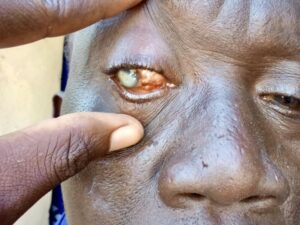 The convulsive situation in Mali, insecurity, restrictions and lack of resources severely limit transport and travel options, which greatly complicates healthcare. The Eyes of the world team developing the ophthalmological cooperation project in the Mopti region constantly discusses the problem of patient screening and works to improve accessibility to quality health care in order to overcome the obstacles of all kinds that hinder it.
The convulsive situation in Mali, insecurity, restrictions and lack of resources severely limit transport and travel options, which greatly complicates healthcare. The Eyes of the world team developing the ophthalmological cooperation project in the Mopti region constantly discusses the problem of patient screening and works to improve accessibility to quality health care in order to overcome the obstacles of all kinds that hinder it.
One of the new initiatives carried out by Eyes of the world has been the donation of two motorbike-tricycles to the associations of traditional therapists and herbalists in the Bankass and Koro health districts, with the collaboration of the Provincial Council of Gipuzkoa, to transport patients suffering from eye diseases to health centres, either from outlying areas or remote villages. These vehicles are also used to transport elderly or physically disabled people, for eye health promotion events and for trips to the countryside in search of medicinal plants, roots, bark or seeds.

Also with the aim of optimising travel, teleconsultations are carried out to compare diagnoses remotely and see if pathologies can be treated locally or if they require a specialised ophthalmologist’s attention. Two WhatsApp groups have been set up, one in Bandiagara and one in Djenné, each involving a member of the Eyes of the world team, a medical assistant in ophthalmology, 25 community health workers trained in basic eye health, the district head doctor, the coordinator of community health activities and the community health centre supervisors. The medical assistant in ophthalmology receives the photographs and videos of people with eye problems, together with the comments of the health workers, and sends advice and instructions on their treatment or requests a referral to the reference health centre if the pathology requires further attention. This teleconsultation activity is supported by the Government of Navarre.